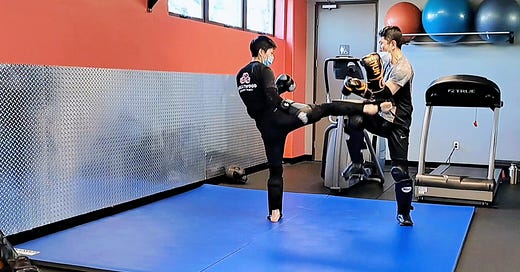Note: This is an unlocked LMA module. If you want access to the rest of Liberation Martial Arts, upgrade your account. We send out learning modules almost daily. If you're no longer getting LMA updates, your payment information may no longer be up to date. Click on the table of contents above to see if you have access to LMA.
In the Liberation Martial Arts (LMA) approach, we don't have styles or techniques but instead have games/conditions and safety rules. What we mean by liberation is expansive, which includes freedom from rigid pedagogy and even rigid idealized concepts of movements or reducing people to their movement abilities. The goal isn't to make a fighter but a better mover who can adapt to various movement conditions. Adaptable movement is about dynamically engaging with your dynamical world.
Practitioners come in once a week or less to the LMA Learning Lab—a small office gym we rent. Their ages range from 20 to 60. In the Lab, they move, play, and heal. Because of our flexible approach, we can do a lot with a little. Within months, practitioners, including myself, began adeptly moving through various modalities and rulesets. I was learning and exploring along with everyone else.
Most of my life had been spent submission grappling, with very little attention given to takedowns. Then, due to some deaths in the family and injuries, I stopped training. Then COVID hit. My political beliefs wouldn't allow me to return to any commercial gym. I was also struggling with debilitating chronic pain. The LMA approach is the only reason I'm back training, and for so many reasons, it's the only Way I can continue to train.
Rather than working around my pain, the LMA Way began reducing my pain. Much of this is a byproduct of movement diversity and our philosophy of breathing and releasing tension during movement. The more I move, the more at ease I am. I went from barely being able to move to learning various martial movement systems. None of this would have been possible without a trustworthy care-informed community.
Our progress begins with unlearning the colonial model of movement and learning, where every domain and movement is compartmentalized and alienated. Coloniality limits us by establishing artificial borders, gates, and complications that enforce path dependency and render our own bodies and their movement potentials inaccessible. However, if we stop seeing human movements as isolated silos and instead view them as a Way to navigate space, and if we approach movement acquisition as exploratory play, we're not only accessing various movement systems but also reclaiming our bodily self-determination. What has been kept from us is the potential of our bodies. By limiting us, coloniality controls us. Without alternatives, we're only left with its path.
As a training organizer, I am not limited. I can and do work with people much better than me at any individual ruleset because I am not their master. I'm a training organizer and designer who can help anyone organize their training. I'm not teaching them their art or sport. I am helping them unlearn while guiding them through our approach.
If you need to train every day just to see minor improvements, and even then, the results are so unreliable that they only benefit a handful of people amidst high turnover, that's not impressive—it's an indictment. Sacrificing every other aspect of your life to excel at something isn't bragworthy; it's a scathing criticism of the system. Adhering to a toxic, abusive, and inefficient system that barely serves non-disabled young people is only commendable if you are indoctrinated by that system.
In this video, another practitioner and I are playing under a modified Thai-boxing ruleset. Over several months, meeting once a week, we grew together. Not all of our time was spent under this ruleset; we've explored various games. Despite splitting time between games, we made radical progress. Being radically different also means radically more efficient and safer than normative approaches. Allowing individuals to determine their own future is more effective. However, our practitioners don't compete with each other's progress. On the contrary, we are partner-focused rather than self-centered. We celebrate each other.
We don't have fun while working hard; we work hard because we are having fun. We work hard because we all like each other. We recognize that rest is radical, but so are fun and kinship.
To access the Liberation Martial Arts curriculum and contribute to the sustainability of this project, consider upgrading your membership. If you've been putting it off, now would be a great time to sign up. Find other ways to support us here. – Sam
✊✊✊
(I write daily about martial arts and other topics from a liberatory perspective. If you like my work, upgrade your subscription. You can also support me on Patreon or make a one-time donation on Ko-fi. Find Southpaw at its website. Get the swag on Spring. Also check out Liberation Martial Arts Online.)






Share this post